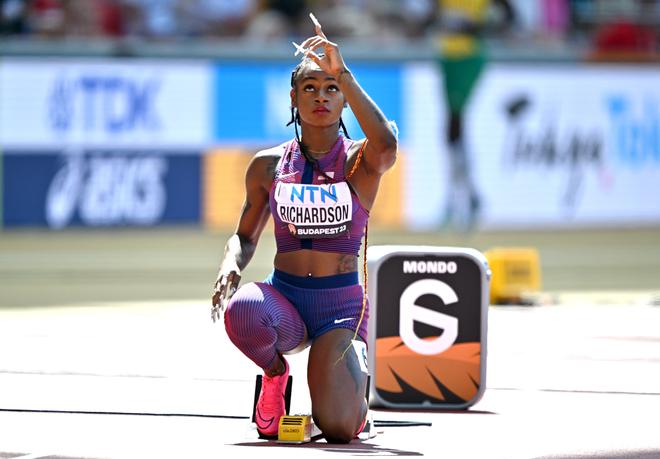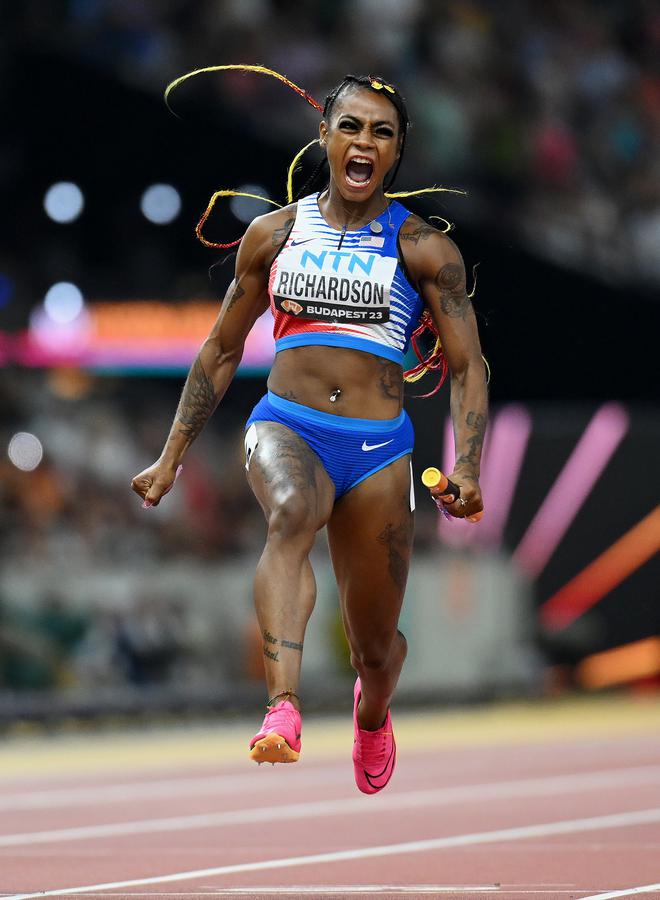

Sha’Carri Richardson was on the superstar arc when she broke the 100 metres NCAA collegiate record as a 19-year-old in 2019.
With her obvious talent, feisty attitude and striking charisma, she looked set to blossom into not just an elite sprinter but also a fan-favourite who could fill stadiums. When she cruised to a win at the US Olympic trials two years later, with her orange hair flowing behind her, it appeared as if another fairytale script of a champion in waiting was unfolding.
But that victory quickly came off the books after she tested positive for marijuana — a doping violation she readily admitted, saying she was in a bad place after her mother’s death.
Downward spiral
A raucous debate — a lot of it hashed out on social media — ensued over whether marijuana, not a performance enhancer, belonged on the banned list (it’s still there), but also whether regulators were too eager to go after a young, outspoken, Black, American woman (they said everyone is subject to the same rules). Her name turned into a litmus test in a wide-ranging discussion about race, fairness, the often-impenetrable anti-doping rulebook and, ultimately, about the sometimes razor-thin line between right and wrong.
Richardson spiralled downward for a while, both off the track and on. Her initial contrition — which even earned praise from US President Joe Biden — seemed to harden into something close to bitterness. She finished ninth in her much-hyped return from suspension at the Prefontaine Classic in 2021. She then saw her hopes of challenging for a medal at last year’s World Championships in Eugene go up in smoke when she failed to qualify in the trials.
Richardson finally started rounding into form to start 2023. The World Championships at Budapest was to be the ultimate proving ground for the Texas-born dynamo after years of enormous expectations. And she finally delivered, overcoming the challenge of being stuck in lane nine to earn a gold medal in the biggest 100 metres race this side of the Olympics.
In addition to winning the blue riband event, the 23-year-old anchored the American women’s team to gold in the 4x100m relay and took bronze in the 200m, capping a stunning comeback with a star-making performance in her first major competition on the world stage.
“I told you all. I’m not back, I’m better!” she said, reprising a mantra she has recited all year.
Richardson’s take-no-prisoners approach and pugnacious style were features of her 100m win in a field that had some of the fastest sprinters in history. Lining up on the edge of the track in lane nine — as tough a spot as there is because there’s no way to sense how the top contenders are doing — was a disadvantage, but it made no difference to Richardson.
Even though she had the third-slowest start, nobody got too far ahead. In the end, it was a race between her and Jamaica’s Shericka Jackson, who took silver in 10.72. The iconic Shelly-Ann Fraser-Pryce, seeking a remarkable sixth World 100m title at the age of 36 after an injury-hit season, took bronze in 10.77. Marie-Josee Ta Lou was fourth in 10.81.
Richardson’s 10.65 was a World Championships record — Florence Griffith-Joyner’s 35-year-old World Record of 10.49 still stands — and matched Jackson for the best time in the world this year. Although Richardson came in 2-0 against Jackson in head-to-head matchups this year, she was still a 5-1 underdog in the race — in part because she was a rookie going against a field that had amassed 38 Olympic and Worlds medals among them.
“All the heavy hitters were going to bring their ‘A’ game, so it helped me pull out my best ‘A’ game, as well,” Richardson said. “I’m next to living legends. It feels remarkable.”
A race for the ages
The win heightened the anticipation for the Paris Olympics, which starts less than 12 months from now. Missing from the Worlds field was Elaine Thompson-Herah, the two-time defending Olympic champion in the 100 and 200. A Parisian showdown potentially featuring Jackson, Fraser-Pryce, Thompson-Herah, Ta Lou and Richardson promises to be one for the ages.
“The competition is only going to get hotter from here so I need to prepare myself for the Olympics,” Richardson said. “This has been indescribable and I know there is better to come.”
Asked what message the victory sent, she said, “Never give up. Never allow media, never allow outsiders, never allow anything but yourself and your faith define who you are. I would say, ‘Always fight. No matter what, fight.’” Richardson, who thrives on confrontation, said it was as much “the haters” as her close circle that had driven her to success.
When asked what she had fixed, either on the track or off it, she didn’t speak about technique, speed or tactics. “You bring who you are onto the track. You bring your athlete into your life,” she said. “There is no separate, honestly. So I’m glad I can display who I really am. Not my pain. Not my sadness. I’m happy I can sit here and be happy, just knowing that it all paid off.”
About a year ago, she bared her soul in a live chat on social media, urging people to find their true selves, much the way she had done. Richardson said that while she never doubted her own ability, she had allowed “anger” to get the better of her in 2022.
“These last two years I’ve always had the ingredients to be the athlete I know I can be and that I train to be,” she said. “I feel like where I am now, I’ve always been this person — it’s just been locked in me. Last year I was angry. I saw red everywhere I went. And I was going to make sure everybody felt that as well. Now I’m at a point where I see me.”
Polarising but authentic
While Richardson remains a polarising figure, some of athletics’ greatest champions feel her authenticity is a breath of fresh air and exactly what the sport needs.
Former 200m and 400m World and Olympic champion Michael Johnson said, “She’s very authentic, she doesn’t make excuses. Some people love to love it and some people love to hate it. It’s great for the sport because she has a personality that is unmatched. The sport needs this now, to draw in people who are not just track fans.”
“It’s fantastic, isn’t it?” said World Athletics president Sebastian Coe, a two-time 1500m Olympic champion in a previous life. “[Noah Lyles, who bagged three gold medals, and Richardson are] absolute rock stars, they both have come through in the most powerful way.”
With her penchant for regular changes of hair colour and brightly painted nails, Richardson has earned inevitable comparisons with the late Florence Griffith-Joyner throughout her career.
Richardson embraces the comparison, but is intent on forging her own legacy. “I’m definitely flattered of course, to be compared to the greatest of all time,” she said. “Flo-Jo just strived to be herself whenever she stepped on the track. So as much as I love that comparison, I’m just me. I’m just Sha’Carri Richardson, and I plan on being Sha’Carri Richardson when I leave this sport.”







